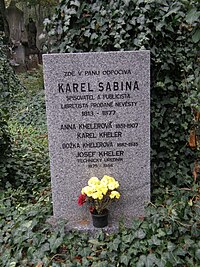Karel Savina -Wikipedia
Source: Free encyclopedia “Wikipedia”
|
|
This item ” Karel Savina Is just translated. It may contain unnatural or ambiguous expressions, and it may be difficult to read as it is. (Original text: English version “KAREL SABINA” 06:28, 26 February 2013 (UTC) )
We are looking for those who cooperate with corrections and additions to make the current expression more natural. See also notes and history. ( May 2013 ) |

Karel Savina ( Karel Sabina , December 29, 1813 -November 8, 1877) is the Czech Republic [Note 1] Writer, journalist. Arian Jerin Ski ( Arian ) or Leo brass I also used pseudonyms such as (LEO BLASS).
Karel Savina was born as an outsider of a daughter of a brick craftsman and a carrier of a sugar manufacturing plant in a laundry shop. Savina himself said that he was a private child of Polish nobles. After that, he went to college and studied philosophy and law, but did not graduate. In 1848, Savina formed a secret steep political circle “Repeal” and became one of the leaders. The origin of the circle name was inspired by the Irish revolution. [first] 。 He is also a member of the National Committee and the Czech Council. At this time, Savina wrote many articles in many magazines. Some of the things I wrote were subject to censorship. At this time, he met Bedorujiha Sumetana, the ancestor of the Czech National Rakuju, in the 1848 Prague Confusion, when Savina participated.
In 1849, Savina was arrested for participating in May Coup. “May Coup” is an organization that was influenced by Mikhail Bakunin and made a rebellion in Prague. [2] 。 In 1851, Savina was sentenced to death with the other 24 people. However, the Emperor Franz Joseph I was changed to 18 years in prison and imprisoned in the Olomouz prison. About six years after the ruling, in 1857, Franz Joseph I was released on May 8th. After the release, he returned to Prague and became a free writer.
After that, he wrote a riblet of Smetana’s opera “Bohemia’s Brandenburg”. In addition, the libret of the opera “Sold Bride” is also provided to Smetana. The latter was the most popular work of Smetana opera.
In 1870, the newspaper Vaterland posted a letter indirectly stating that Savina was a police information provider. Savina makes a trial against the newspaper and wins. However, in an unofficial trial held in 1872, eight Czech celebrities (some of them are Yang Nella. Vie Cheslaf Harlek The jury, which consists of a leon, discovered that Savina would like to be back as an information provider, and forced Savina to live in Prague to prevent exile abroad. Savina denied the accusation, but today it has been proven that Savina was actually a police agent since 1859. [3] 。 It is speculated that Savina became a police information provider, but it was not clear, but it was due to disappointment after the revolution that was not successful and extreme poverty after the release. Savina has become an exile and no books are sold. Furthermore, all the names of Savina in posters were replaced with initials. [Note 2] 。 Every time I went to the table, I took the danger of being attacked. However, Savina continued to work with a pseudonym. Some of the pseudonyms are unknown today, and it is quite difficult to create a complete biography of Savina, which historians work hard. On November 8, 1877, he died in the world of poverty and people’s contempt. According to the corpse inspection, the cause of death was “EXHAUSTION). 63 years old died.
As a journalist, Savina was mainly active in “Květy”, “Moravský Týdenník”, “Humorist”, “Lípa”, “Pražské NOVINY”, and “Wčela”. In the latter two, Savina was involved as an editor, and the two predecessors were Karel Havryyk Borovsky.
novel [ edit ]
- The tomb (1837)
- Ravings (1857)
- Hedre (1858)
- Just three years! (1860)
- In the desert (1863)
- Revived graves (1870)
- Morana or the world and his nothingness (1874)
drama [ edit ]
- black Rose
- Advertisement
- Jiřího z Podebrady jester
- Small -town knockers
story [ edit ]
- Paintings from the 14th and 15th Age (1844)
- Stories, legends, paintings and novels (1845)
Libret [ edit ]
others [ edit ]
- Poems (1841)
- Introduction (1845)
- Spiritual communism (1861)
- History of Czechoslovak Literature
Savina in popular culture [ edit ]
Czech modern poet Ivan Vernish Some prose poems mentioned Savina.
- ^ At the time of Karel Savina’s alive, until 1867, the Austrian Empire and the Austrian -Hungary Empire.
- ^ In such a thing, a “sold bride” is also included. And to some of them, riblets were considered as a basis for the blame and charges of him. But in 1971 Milos Love Ivanov Books “” ” Labyrinth ] Proved that this idea, that is, the idea that Savina was innocent, was wrong.
References and external links [ edit ]
Recent Comments